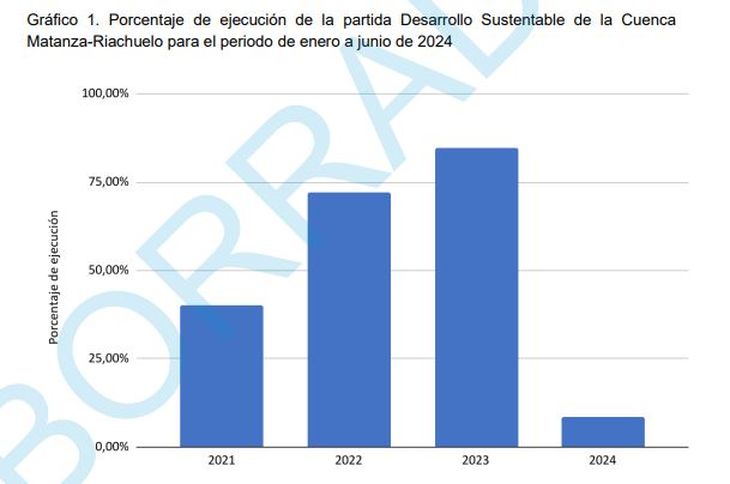As a result of the decision to extend the 2023 Budget for this year and the Government’s “non-negotiable” objective of achieving a fiscal surplus, Many items allocated for human development suffered a collapse of almost 50% in real termsEnvironmental experts in particular questioned the genuineness of the positive balance achieved by the Ministry of the Economy, since it was essentially a “brutal” underfunding of programs.
Within the framework of the workshop “The keys to the budget: what is its economic and environmental impact”, Matthias Cena Trebucqeconomist in the research area of the Environment and Natural Resources Foundation (FARN)stressed that “the desire for a fiscal surplus translated into budget cuts” and that There was “a political decision to defund environmental items” while greater priority was given, for example, to resources allocated to the payment of public debt.
In this regard, FARN emphasized that the dismantling of the State’s capacity to care for the environment has more to do with ideological issues than with a real shortage of monetary resources. According to the Environmental Budget Monitor prepared by the entity, only 3% of the fiscal-financial surplus was enough to keep the items stable in real terms. environmental and those aimed at the penetration of renewable energies.
Overall, the monitor reflected that the current Budget for the first half of 2024 experienced a real drop of almost 24% compared to the same period last year.It is a budget at 2023 values for 2024 prices.. This allowed the Government to manage resources with greater discretion” he said in this regard. Nathan Spollanskyan economist from the Tax Justice program at the Civil Association for Equality and Justice (ACIJ), who was also a speaker at the aforementioned workshop.
According to estimates made by Spollansky, 60% of the adjustment fell on social servicesmainly those linked to social security, which have a very significant weight in the State’s expenditure structure. Another 25% corresponded to the cut in economic servicesparticularly due to lower spending on energy subsidies. In contrast, the items on defence and security, and debt, were the ones that fell the least.
In the same vein, Cena Trebucq said that “public debt conditions the national budget” since “in the last 3 years it has been gaining more and more weight in the current budget” to the detriment of other important items.
Environmental budget cuts.JPG
Environmental budget cuts, in numbers
The researcher added that in 2024 The reduction in education, health, housing and the environment was also very significant.. Regarding this last segment, he highlighted the very low execution of the budget for programs related to the sanitation of the Riachuelo, fire control and the promotion of the energy transition.
As for the sanitation of the Riachuelothe FARN monitor showed that between January and June Only 6.9% was executed of the budgeted for the Sustainable Development of the Matanza-Riachuelo Basin; for every $100 that was executed last year, in 2024 only $4 was executed. In turn, the current budget has already suffered a real year-on-year drop of 44.4% due to the effect of inflation.
“For the Matanza-Riachuelo Basin Authority (ACUMAR)the public body in charge of carrying out the actions established by the Supreme Court, can function as it should, it is essential that the allocated budget is in line with current needs and is executed in a timely manner” the report warned.
ACUMAR budget cuts.JPG

In parallel, the fire-related items – Fire Management and National Fire Management Service (SNMF)- They had a Execution of only 26.7% of its current budgetwhen the average of the three previous years marked 64% for the same period. In this case the The actual drop in the money reserved for this chapter is 43.8%.
It is worth noting that the SNMF has several sources of financing and that almost a third of this corresponds to contributions from the National Treasury, which will not have upward adjustments in the remainder of the year, according to what members of the service indicated to the FARN. According to testimonies, the funds could only increase due to a higher collection by the National Insurance Superintendency.which provides more than a third of the funding.
In the matter of energy transitionthe monitor data exhibited a execution of only 1.6% in the budget allocated to renewable energies and a down 44.4% of the current budget versus the same period in 2023.
How do the Bases Law and the RIGI affect the energy transition?
On the latter, Cena Trebucq recalled that The Bases Law and the RIGI encourage the extraction of fossil fuels, since their spirit is to maximize income from the hydrocarbon sector through benefits such as price liberalization, elimination of royalties, streamlining of concessions, tax and tariff exemptions, and free access to the foreign currency generated.
These policies are implemented within the framework of a conception that it is not the State but society as a whole that must take charge of the transition towards cleaner energy sources, through its production and consumption decisions. However, due to cost issues and accumulated experience, Today market incentives are oriented towards fossil fuels when there is an absence of public policies aimed at changing the paradigm and protecting the future of the environment and economic development.
Source: Ambito




